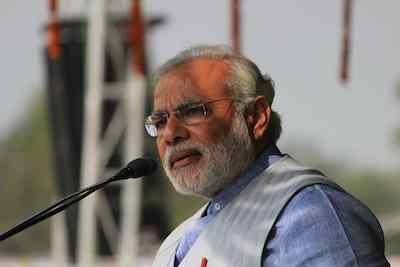
Prime Minister Narendra Modi is trying his best to digitize the Indian economy. One of his efforts was introduction of the national biometric identity program (Aadhaar).
The authorities also seek to reduce reliance on cash, although an unexpected demonetization in November last year led to serious disruptions. The largest bills (in fact, 86% of all denominations) were withdrawn from circulation in the country, where almost all payments were made in cash.
Nevertheless, as the Indian economy is returning to its normal state, the country may be ready to take advantage of these reforms.
"One of digitalization’s advantages, in addition to attracting more money to the economy, is loans," Anil Agarwal, head of Asian financial research at Morgan Stanley, told CNBC on the sidelines of the Asia-Pacific Bank summit in Singapore.
According to Agarwal, India's problem was that most of the funds borrowed in the official sector were from large corporations or mortgages, since banks did not have access to data on individuals or small and medium-sized enterprises (SMEs) who wanted to get loans.
Digitalization is gradually being introduced around the country, tracking the credit history of individuals or SMEs is expected to become easier, and this is likely to give an impetus to the economy.
"We believe that this will create opportunities for employment, which will increase GDP by about 50-75 basis points per year, so the GDP growth [on] the real basis will be 7.1%, the nominal one - about 11%," Agarwal added.
Morgan Stanley predicts that India's GDP will reach $ 6 trillion in 2027 as a result of digitalization. This would make India the third largest economy in the world after the US and China, whose GDP last year was $ 18.5 trillion and $ 11.2 trillion, respectively.
Digitalization also opens the way for the country's share market to become one of the five largest in the world, with a market capitalization of $ 6.1 trillion.
International rating agency Moody's Investors Service on Friday raised India's sovereign rating for the first time in 14 years - from "Baa3" to "Baa2". "The decision to upgrade the ratings is supported by Moody's expectations that further progress in economic and institutional reforms will eventually improve the high growth potential in India," Moody's said.
The rating agency noted a new tax on goods and services as a measure that would "increase productivity," and stated that the Aadhaar system and demonetization helped "reduce the non-compliance with formalities in the economy."
However, Agarwal admitted that it would take some time to introduce a digital system in the informal sector of the Indian economy.
"It will take some time, because this is a significant change in habits, a significant change in the business model ... But I think that over the next 12-18 months, by the fiscal year 2019 or the beginning of 2020, you will begin to notice these changes", - he said.
source: cnbc.com
The authorities also seek to reduce reliance on cash, although an unexpected demonetization in November last year led to serious disruptions. The largest bills (in fact, 86% of all denominations) were withdrawn from circulation in the country, where almost all payments were made in cash.
Nevertheless, as the Indian economy is returning to its normal state, the country may be ready to take advantage of these reforms.
"One of digitalization’s advantages, in addition to attracting more money to the economy, is loans," Anil Agarwal, head of Asian financial research at Morgan Stanley, told CNBC on the sidelines of the Asia-Pacific Bank summit in Singapore.
According to Agarwal, India's problem was that most of the funds borrowed in the official sector were from large corporations or mortgages, since banks did not have access to data on individuals or small and medium-sized enterprises (SMEs) who wanted to get loans.
Digitalization is gradually being introduced around the country, tracking the credit history of individuals or SMEs is expected to become easier, and this is likely to give an impetus to the economy.
"We believe that this will create opportunities for employment, which will increase GDP by about 50-75 basis points per year, so the GDP growth [on] the real basis will be 7.1%, the nominal one - about 11%," Agarwal added.
Morgan Stanley predicts that India's GDP will reach $ 6 trillion in 2027 as a result of digitalization. This would make India the third largest economy in the world after the US and China, whose GDP last year was $ 18.5 trillion and $ 11.2 trillion, respectively.
Digitalization also opens the way for the country's share market to become one of the five largest in the world, with a market capitalization of $ 6.1 trillion.
International rating agency Moody's Investors Service on Friday raised India's sovereign rating for the first time in 14 years - from "Baa3" to "Baa2". "The decision to upgrade the ratings is supported by Moody's expectations that further progress in economic and institutional reforms will eventually improve the high growth potential in India," Moody's said.
The rating agency noted a new tax on goods and services as a measure that would "increase productivity," and stated that the Aadhaar system and demonetization helped "reduce the non-compliance with formalities in the economy."
However, Agarwal admitted that it would take some time to introduce a digital system in the informal sector of the Indian economy.
"It will take some time, because this is a significant change in habits, a significant change in the business model ... But I think that over the next 12-18 months, by the fiscal year 2019 or the beginning of 2020, you will begin to notice these changes", - he said.
source: cnbc.com





